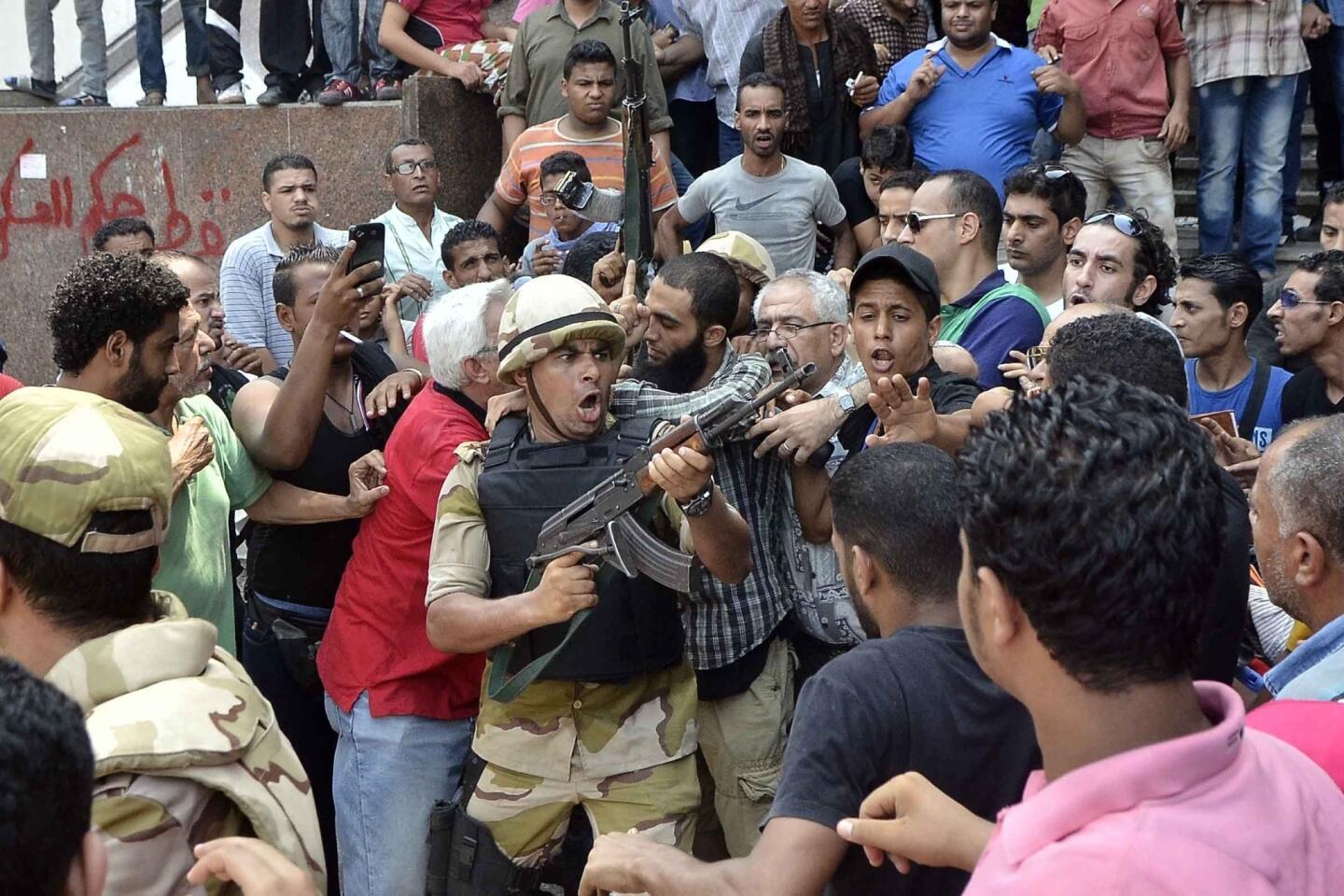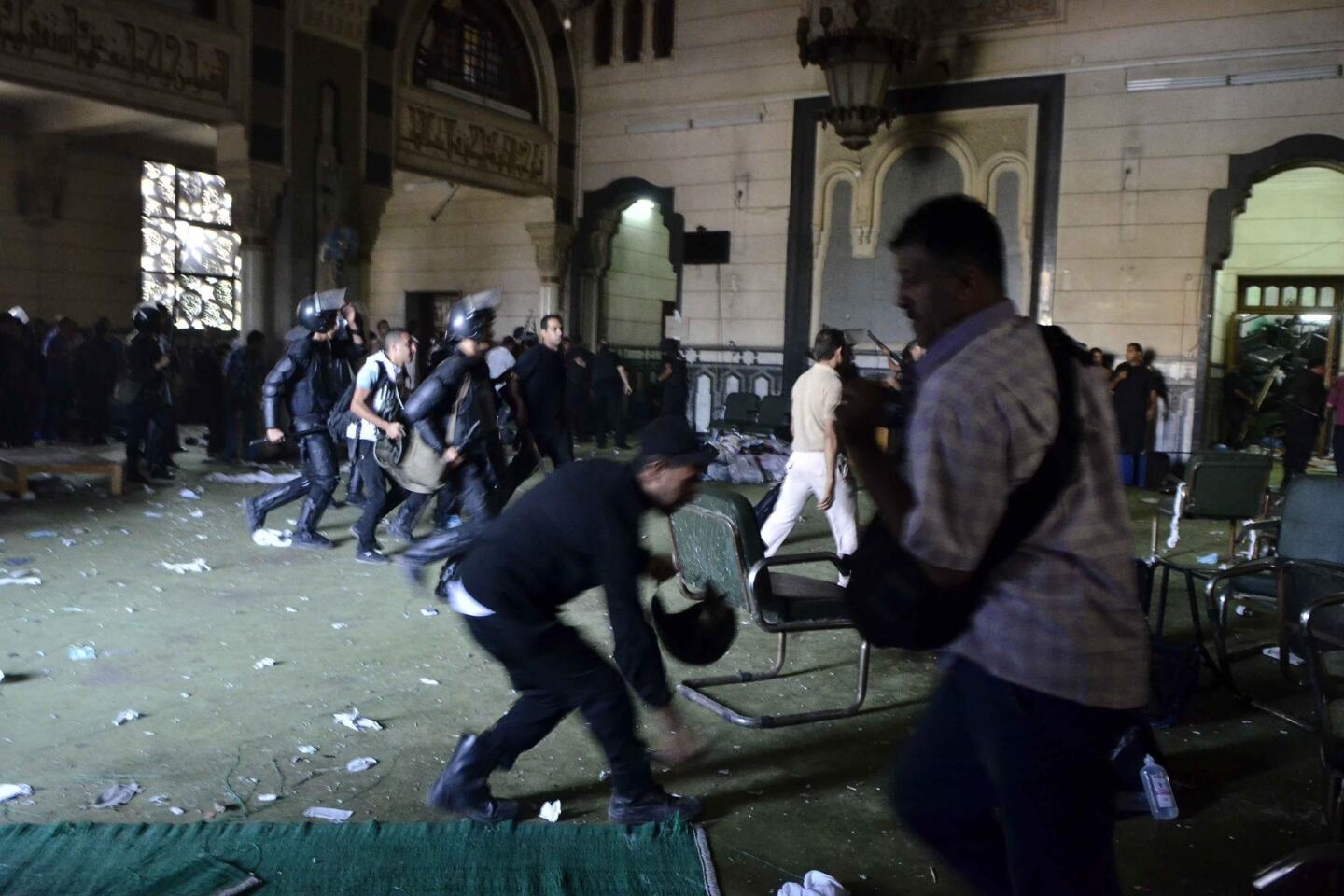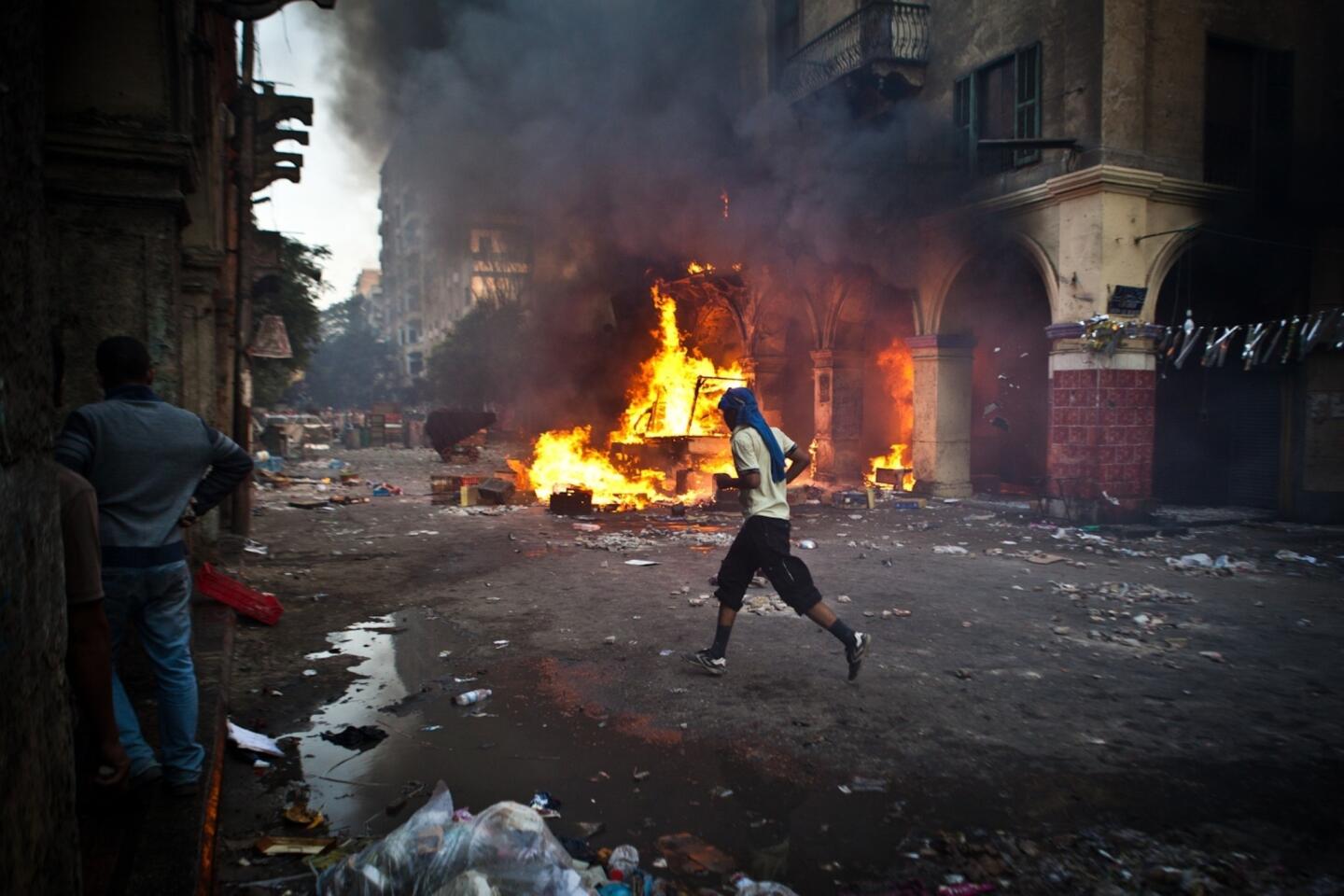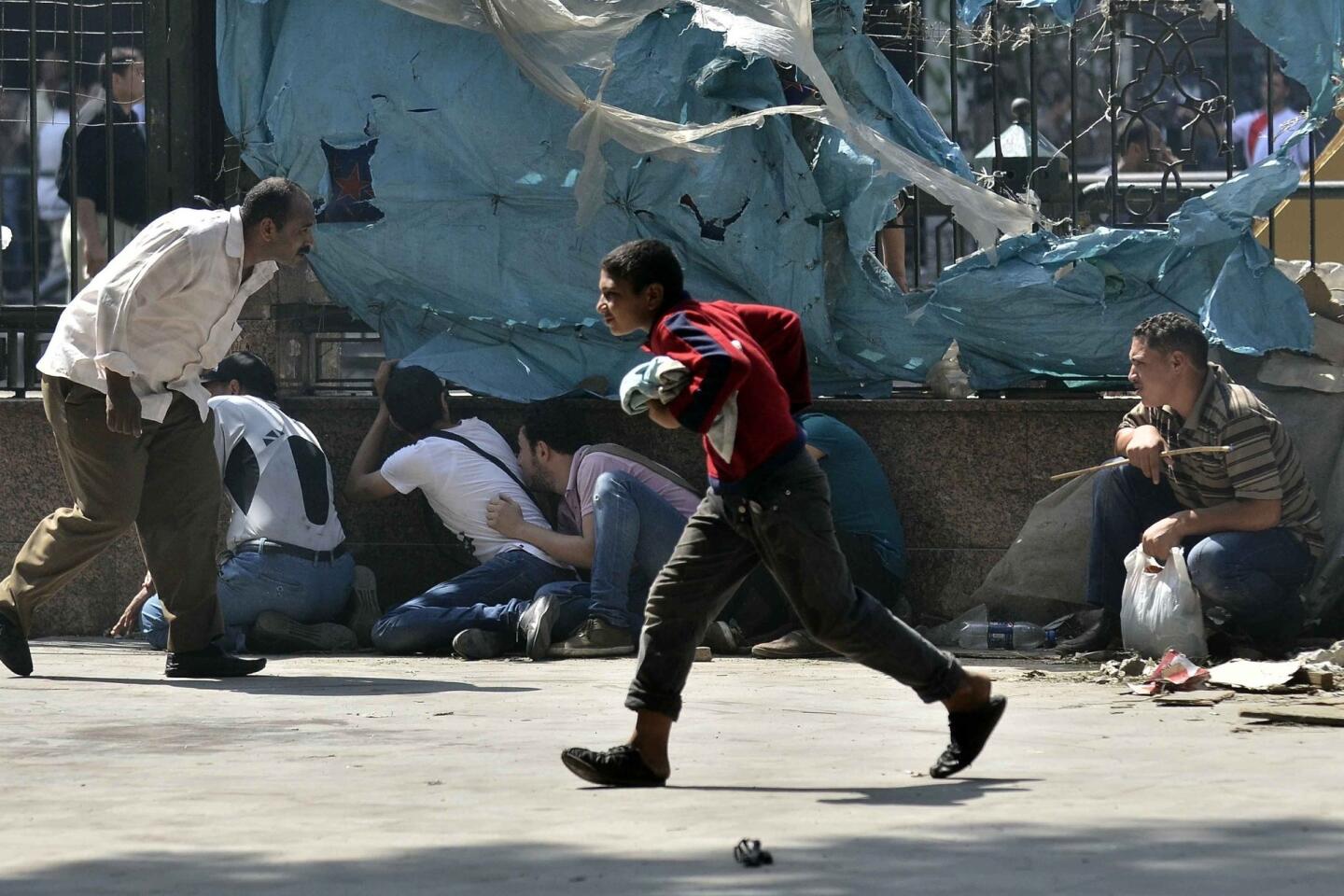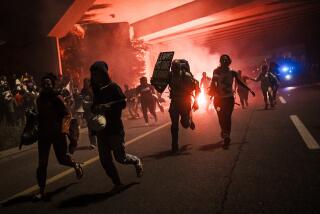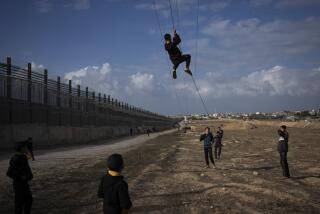Vigilantes emerge as menacing force in Egypt as mosque siege ends
- Share via
CAIRO — The siege at a Cairo mosque Saturday highlighted the specter of Egypt spiraling into civil strife and factional bloodshed among the army, Islamists and bands of vigilantes who are emerging as a dangerous third force in the nation’s turmoil.
That troubling prospect was evident even as imams from Egypt’s top religious institution late in the day succeeded in ending the standoff at Al Fatih mosque, where hundreds of Muslim Brotherhood supporters and anti-military protesters had hunkered as mobs cursed them from the streets amid the rattle of automatic weapons fire.
Clerics from Al Azhar — Sunni Islam’s most revered university, although distrusted by the Brotherhood — hurried through tear gas Saturday and entered the mosque in Ramses Square. Shortly after nightfall, the Interior Ministry announced the standoff was over as the last of the protesters, some of whom were arrested, exited under police protection.
Brotherhood supporters had taken cover inside the building during deadly clashes a day earlier. They turned the mosque into a makeshift field hospital and refused to leave, fearing attacks by security forces and vigilantes. Egyptian news media reported that police fired at the minaret Saturday after gunmen shot at them.
“The government seeks reconciliation, but not with those whose hands have been stained with blood and who have defiled the law,” said interim Prime Minister Hazem Beblawi. His comments came as police arrested more than 1,000 Islamists, including Mohammed Zawahiri, a radical cleric and brother of Al Qaeda leader Ayman Zawahiri.
The government also indicated it was moving to ban the Muslim Brotherhood, which until a coup last month that toppled Islamist President Mohamed Morsi was a powerful political voice. Security forces, which killed about 600 Brotherhood supporters and anti-military protesters Wednesday, now appear intent on crushing the Islamist organization.
Egypt’s Health Ministry also announced that 173 protesters and 57 policemen had been killed since early Friday. One of those reported dead was the son of Brotherhood supreme leader Mohammed Badie.
The scene at Al Fatih mosque was a sign that vigilante groups, some known as popular committees, were rising in neighborhoods to support the army against the Brotherhood. Their presence reveals how perilous Egypt has become at a time when the military is casting Islamists as terrorists in a public relations war over the country’s future.
The government-sanctioned popular committees appeared Friday in Cairo, setting up barricades and guarding neighborhoods with knives and clubs. They are reminiscent of the armed men and boys who roamed the streets in the security breakdown during the uprising that overthrew President Hosni Mubarak in February 2011. The formation of the latest committees was called for by Rebel, a youth movement that has backed the army’s takeover of the country.
For much of the day, security forces did not prevent mobs from massing around the mosque or from beating Brotherhood followers as they exited the building and were hurried toward police trucks. Those in the crowd, mostly young men, brimmed with rage, many of them shaped by an us-against-them nationalism perpetuated by the military in recent weeks.
It was unclear, though, whether the new government would be able to control the mobs as Egypt becomes more fragmented and bitter over a disastrous economy as well as political divisions. There is danger of increasing conflicts between vigilantes and militias attached to the Brotherhood and other Islamist groups, including extremists, such as the militants in the Sinai Peninsula.
“This isn’t the way it’s supposed to be,” said Hamdi Abdelgelil, who stood in the courtyard of the mosque as men with sticks pummeled a man attempting to leave. “Beat him, beat him,” they chanted as the man retreated back inside, running up stairs that were speckled with blood.
“This is not Egypt. Where is the security?” said Abdelgelil, shaking his head. “These people [the army] are supposed to be our masters, but we look like barbarians.”
“This is the Brotherhood’s fault,” men around him yelled.
Taunts and epithets echoed between frequent bursts of police gunfire that pocked the minaret. Muhammad Ahmad, a photographer who had been at the mosque all day, said he heard only one shot fired from the minaret. But police took aim and people cheered.
“You want to destroy the country,” an old man yelled to those inside the mosque.
Security forces seemed unwilling or unable to disperse the crowd, which at times attempted to snatch Brotherhood supporters leaving the mosque. Police were attacked on several occasions as they escorted those inside the building to trucks. Security forces fired into the air throughout the day, but the mob was not scared off.
Those in the crowd brandished poor men’s weapons: sticks, chains, a coat hanger. The men filled the mosque’s courtyard and spilled out into Ramses Square, where they mingled with boys and women who sat on curbs and medians as if watching a parade. Shopkeepers shuttered their windows, and smoke drifted from a warren of alleys, blowing past soldiers and barbed wire.
“The people want the execution of the Brotherhood,” said one man. Some people emerged from the mosque already injured, but the crowds did not relent. “Good, good, let them be beaten to death,” someone said as a bandaged man struggled to walk through the mob.
Three women who had left the mosque in the morning were placed in a military armored vehicle. When they were later escorted into a minibus, men surrounded the vehicle. A few in the crowd tried to hit them. The crowd began rocking the bus, and the women urged the driver to leave quickly.
“Sisi, Sisi, Sisi,” the mob chanted throughout the day, holding up pictures of Gen. Abdel Fattah Sisi, commander of the armed forces, and a hero to millions of Egyptians. Sisi and Interior Minister Mohamed Ibrahim ordered the crackdown Wednesday against two massive sit-ins organized by the Brotherhood.
“I want to give Sisi and Mohamed Ibrahim and the whole military permission to kill all of them,” said Sayid Shindi Ali, a businessman who complained that he hadn’t worked for more than a week because of the unrest. “The entire Egyptian people will give them the permission to kill them. They are destroying the country.”
A man beside him began to agree. Then another anti-military protester was brought out of the mosque, and the man yelled: “Bring him here, bring him here.”
The protester, his shirt ripped open, his glasses askew, winced under a constant barrage of fists.
“Get off me, get off me,” he pleaded.
Special correspondent Ingy Hassieb contributed to this report.
More to Read
Sign up for Essential California
The most important California stories and recommendations in your inbox every morning.
You may occasionally receive promotional content from the Los Angeles Times.
